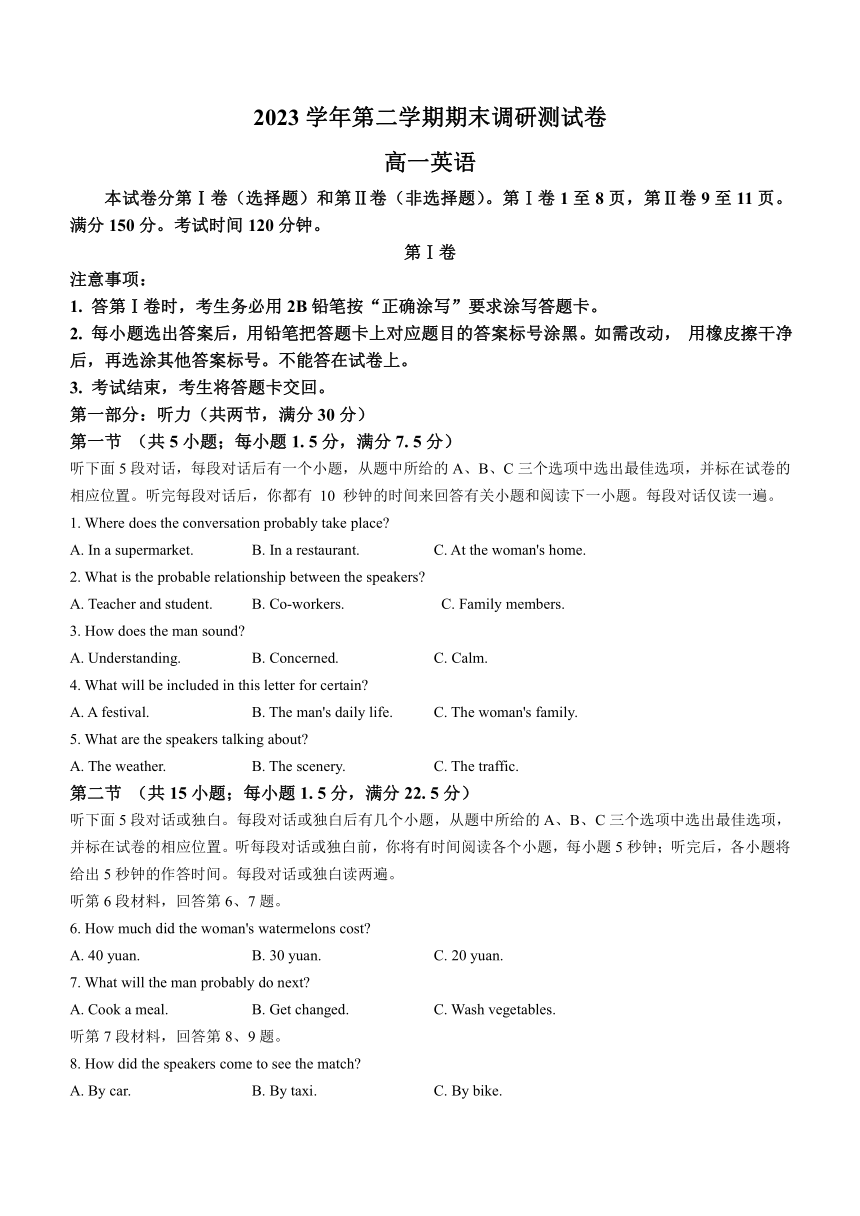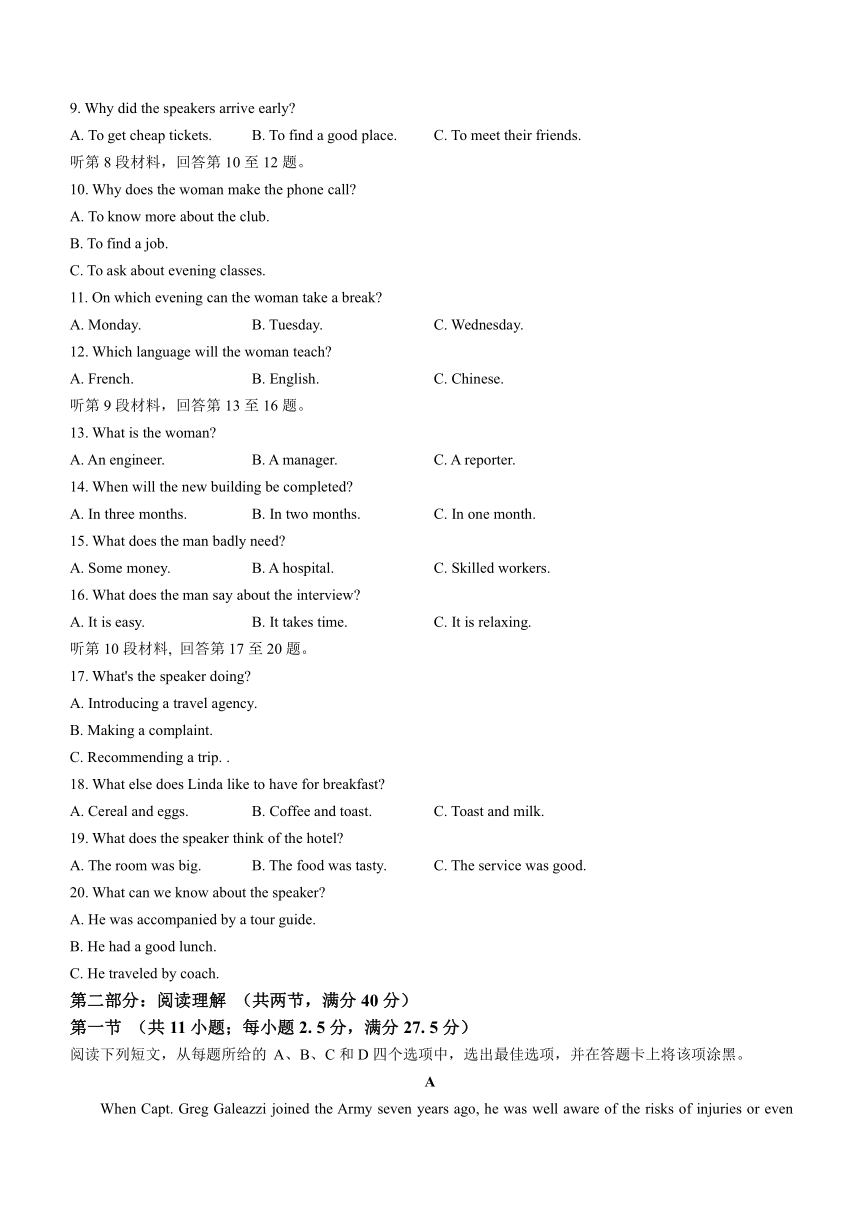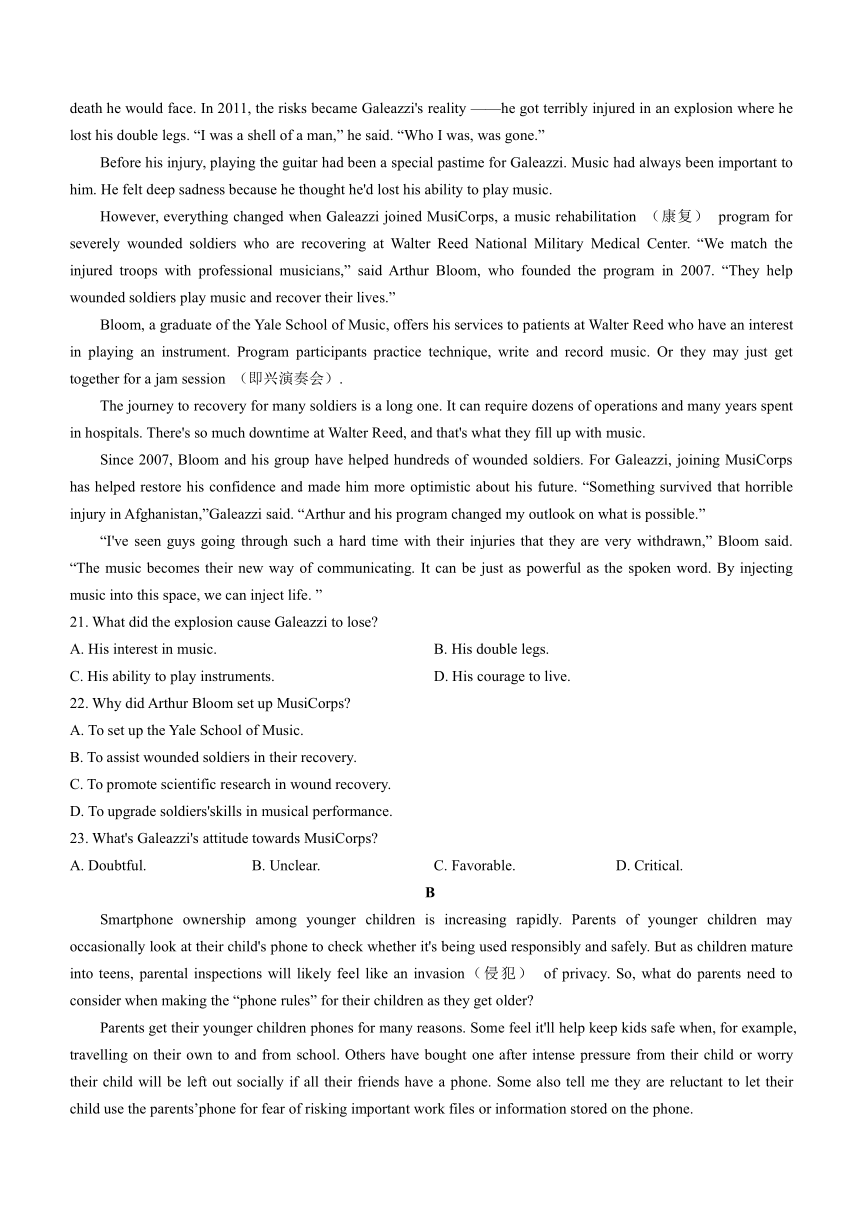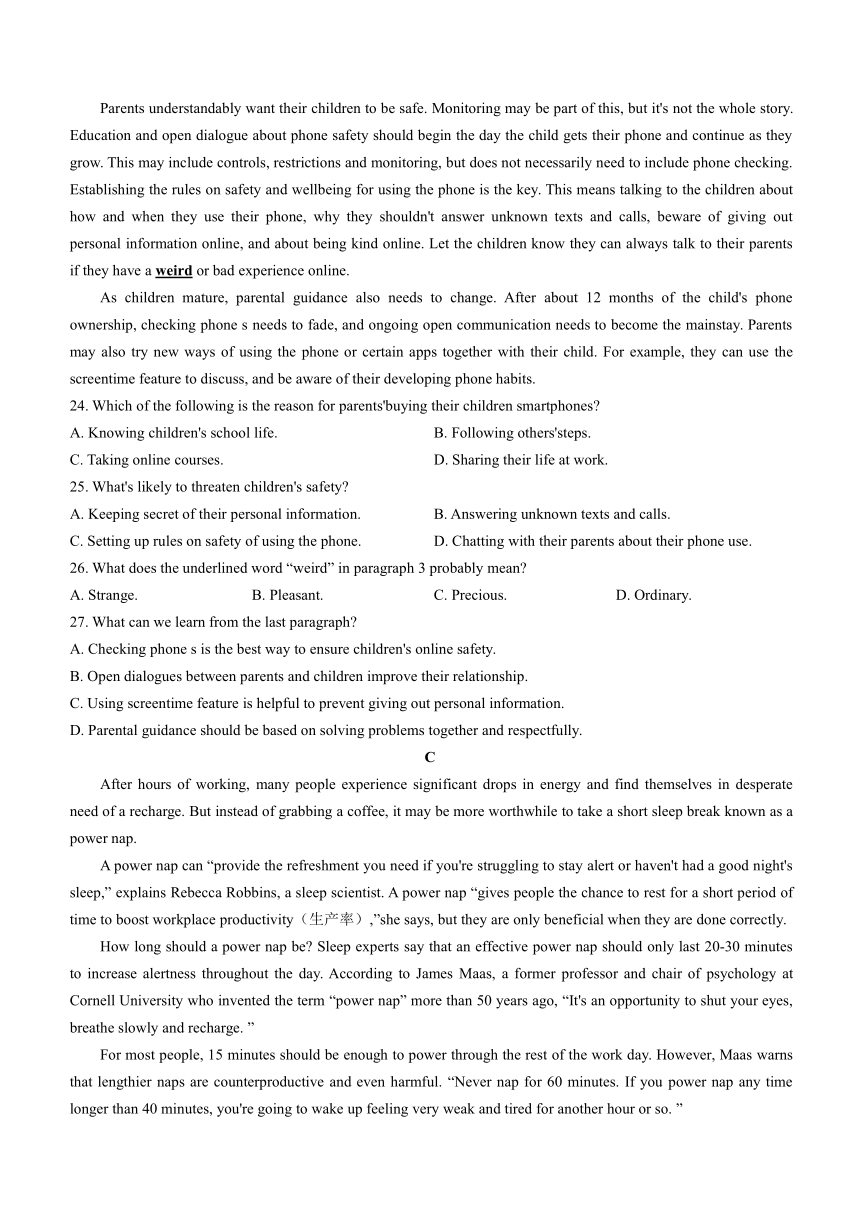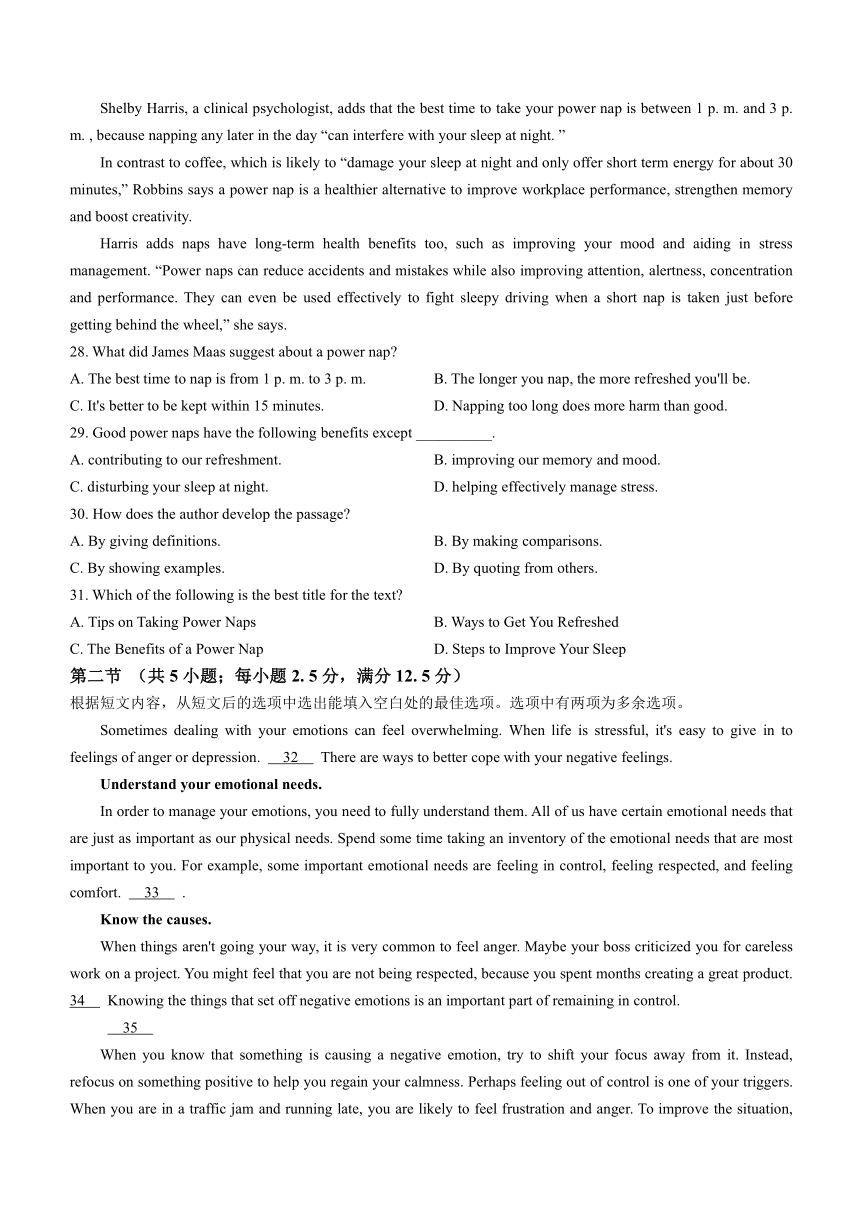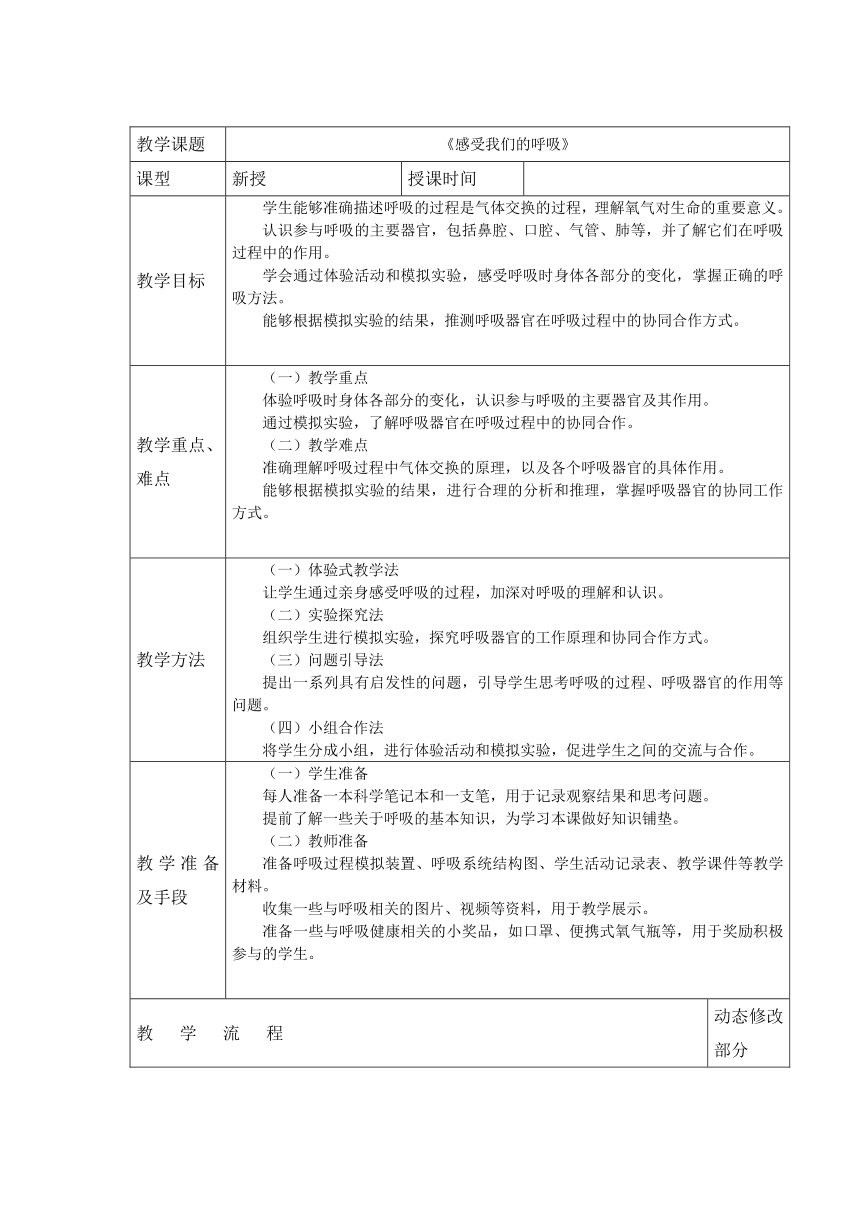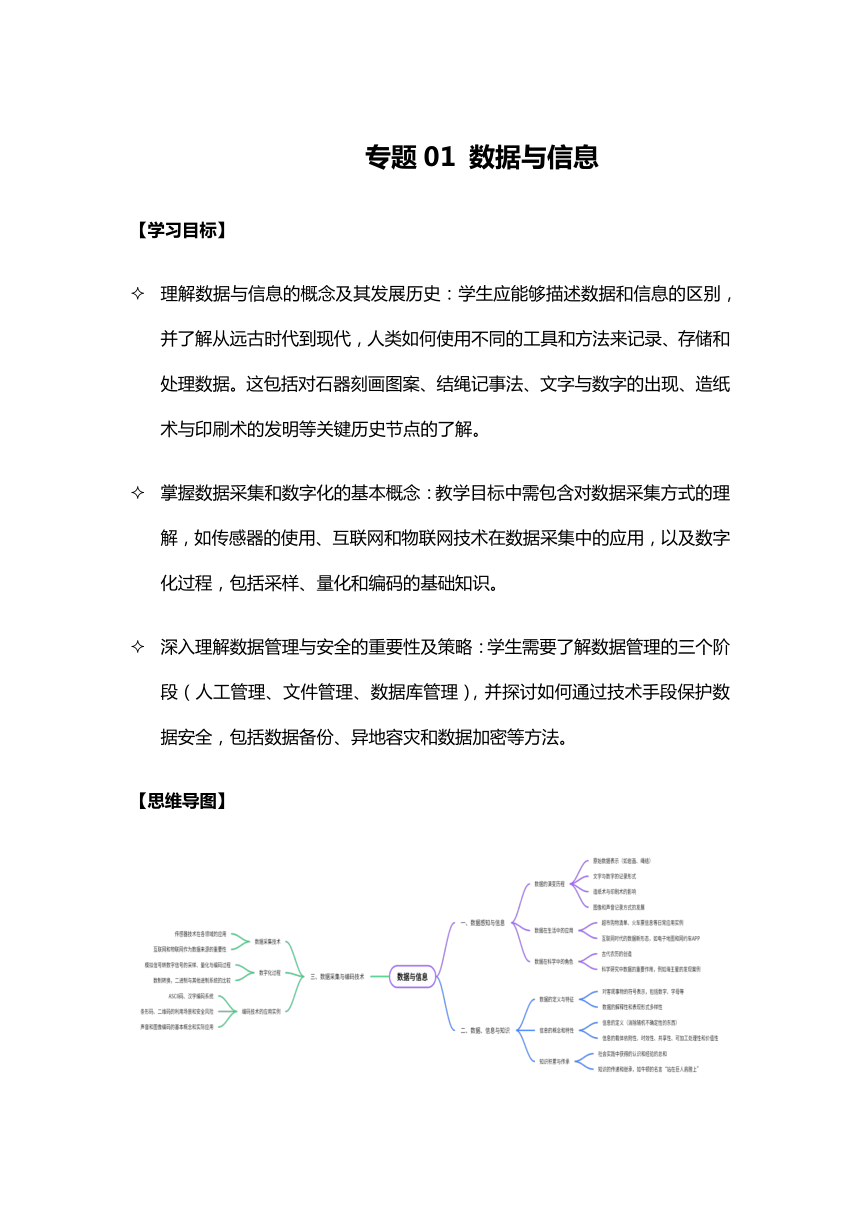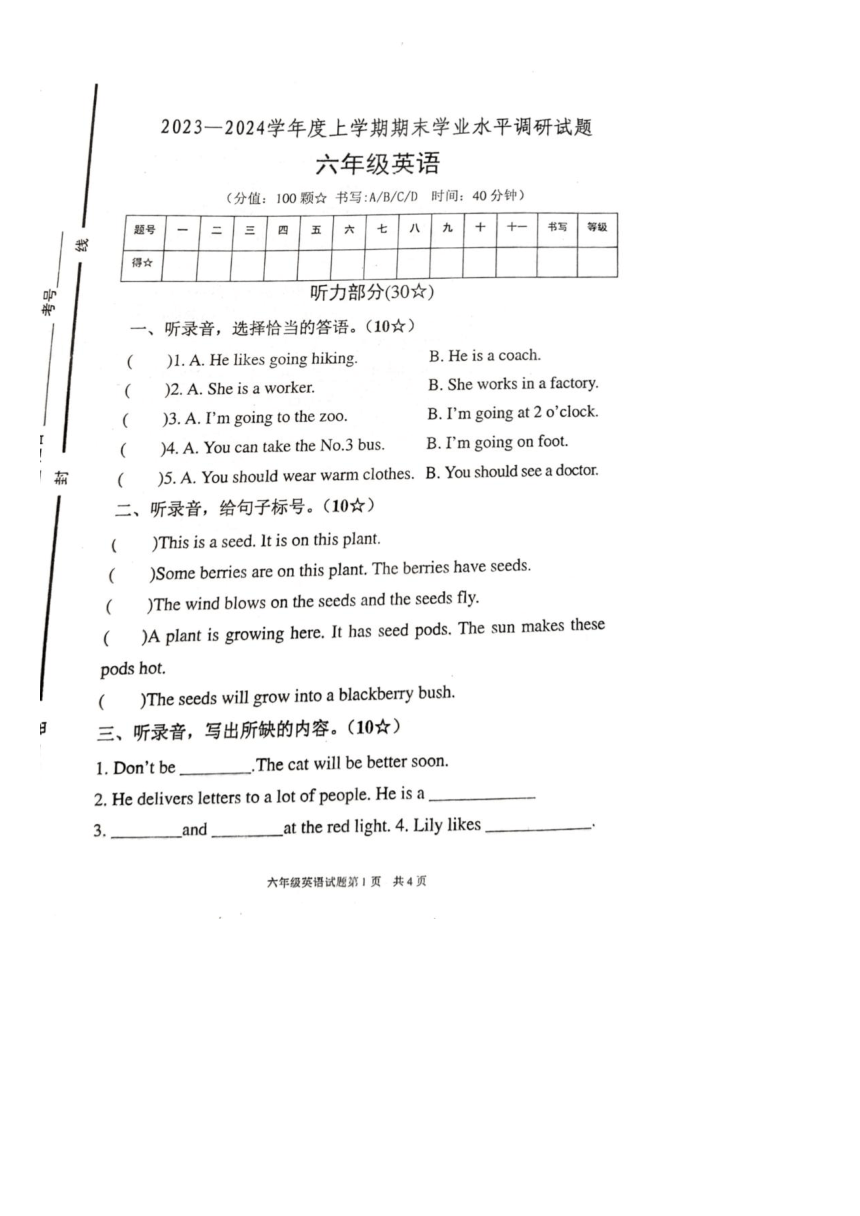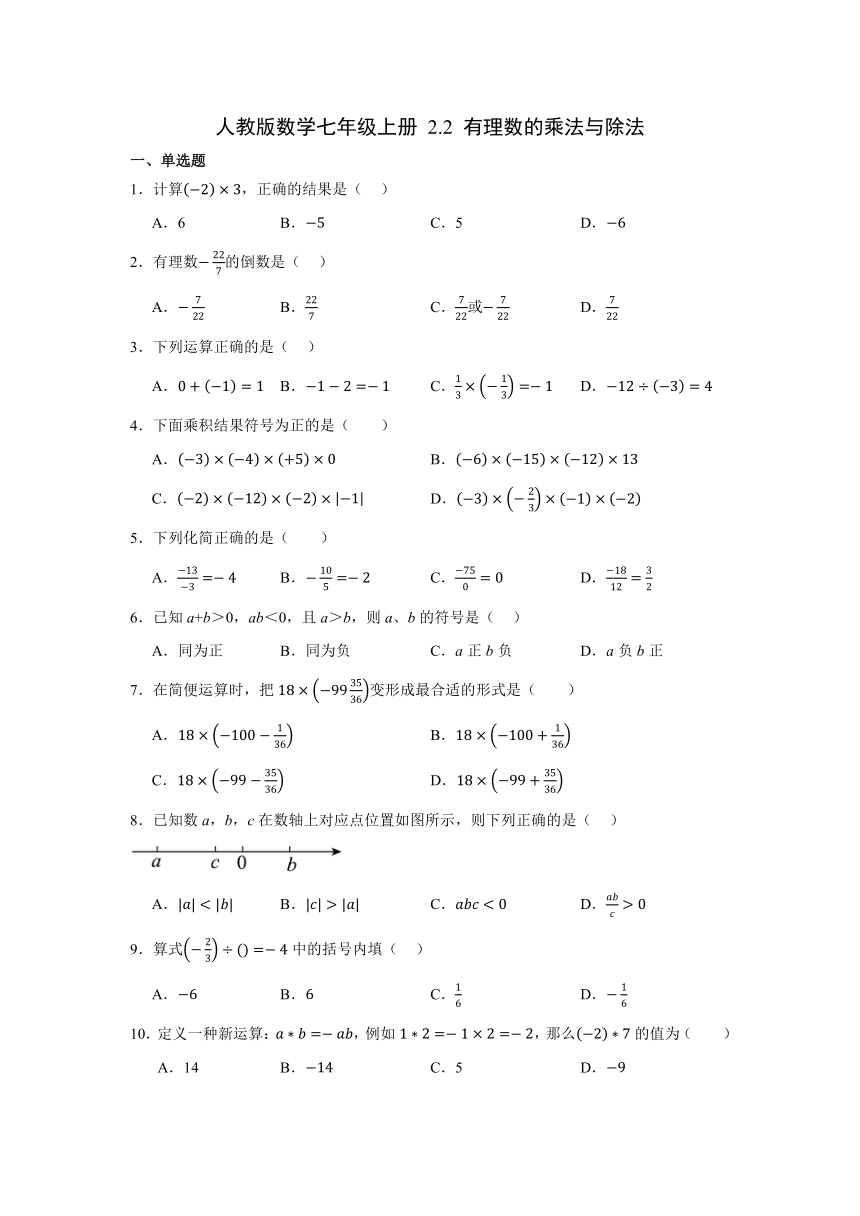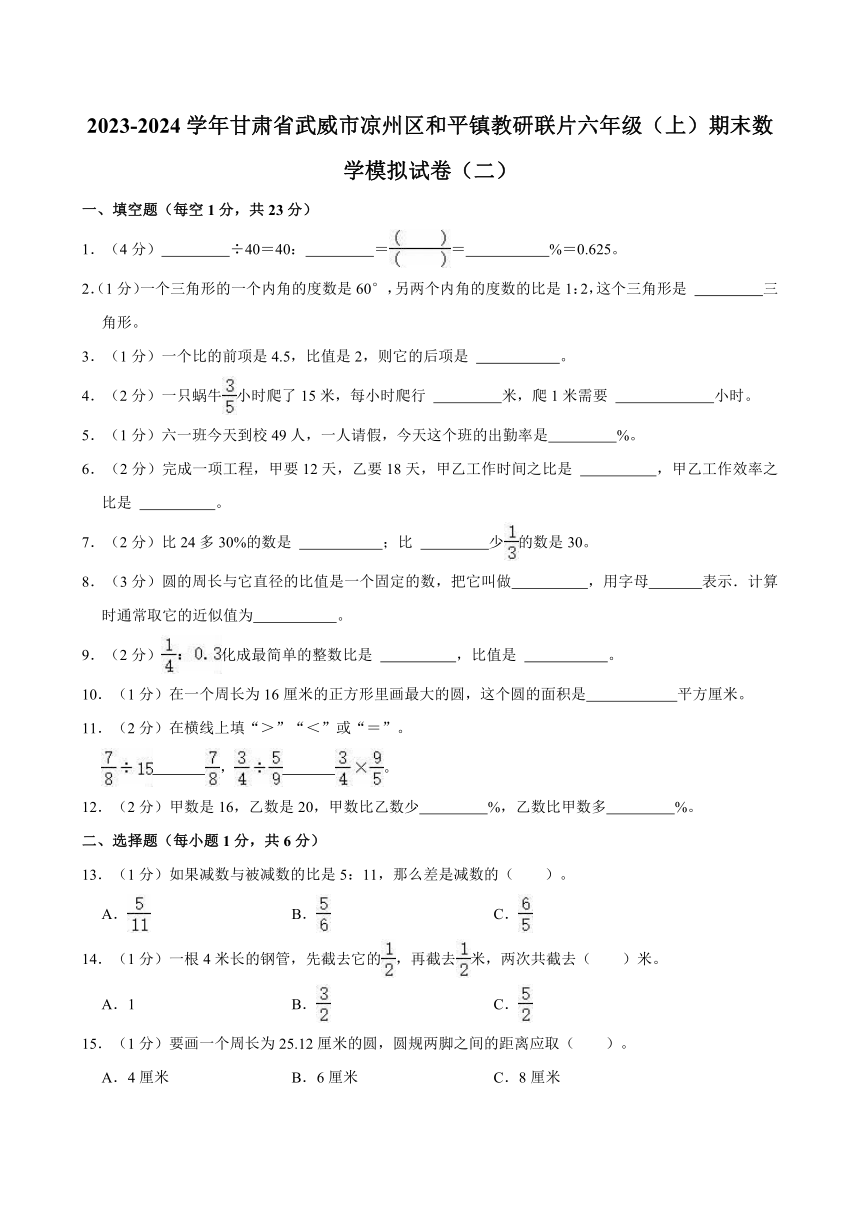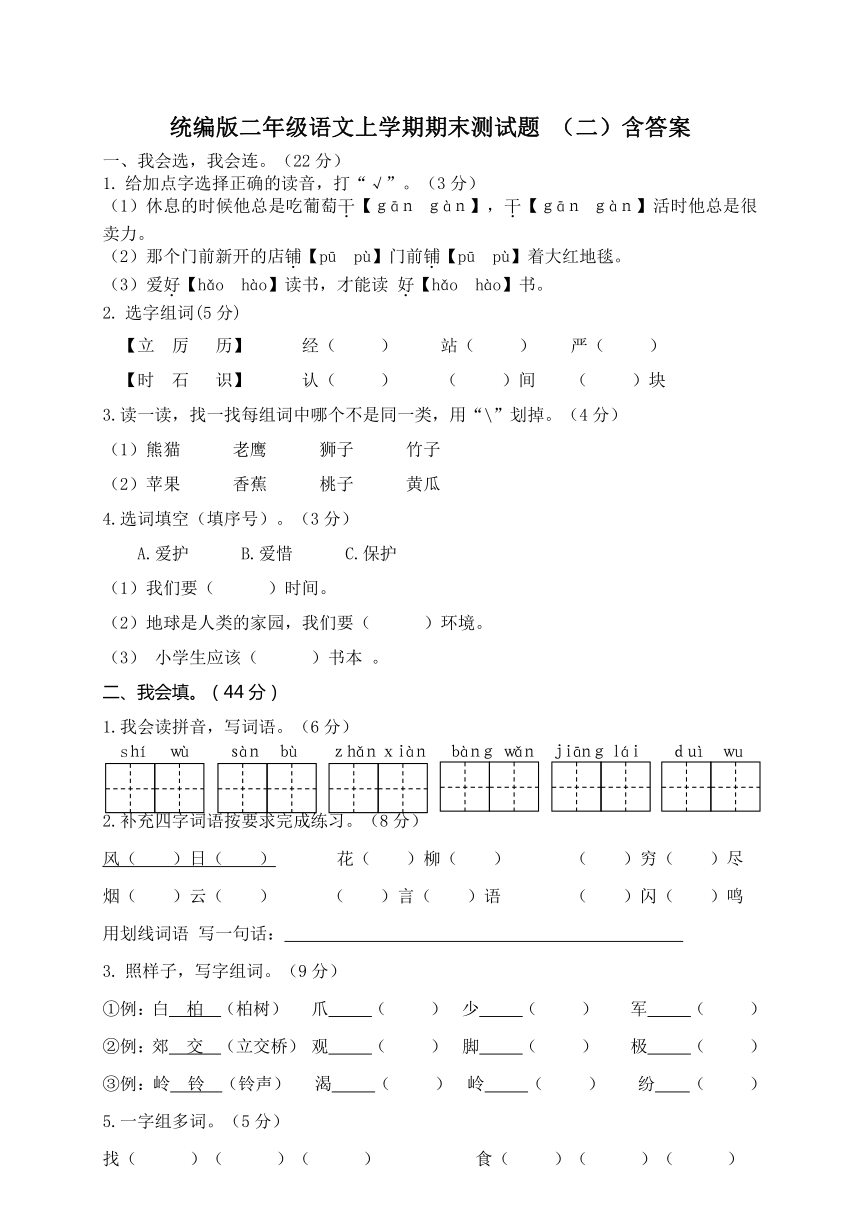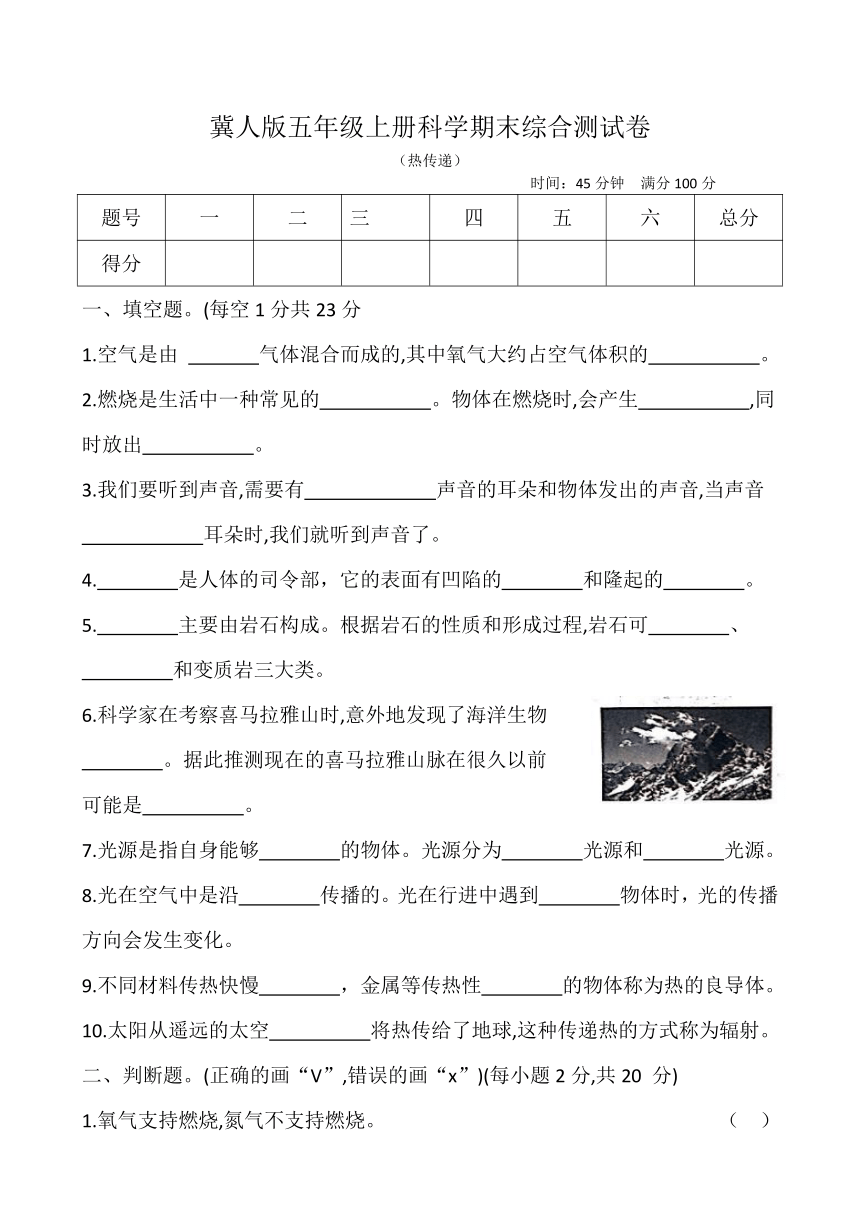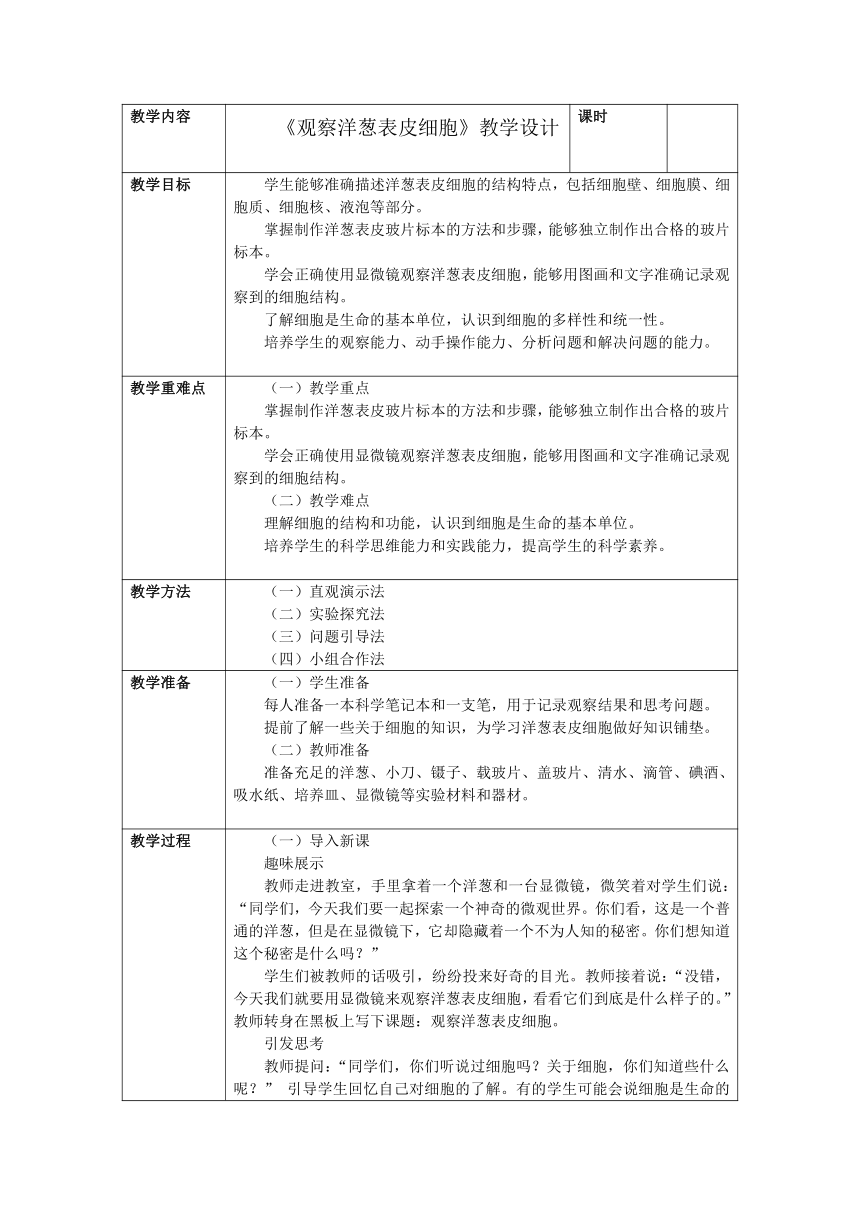浙江省湖州市2023-2024学年高一下学期6月期末英语试题(word版含答案)
2024-06-29 18:28:00 学考宝 作者:佚名
Word文档版
学考宝(xuekaobao.com)友情提示:html格式不完整,如有需要请根据文末提示下载并进行二次校对Word文档。
2023学年第二学期期末调研测试卷
高一英语
本试卷分第Ⅰ卷(选择题)和第Ⅱ卷(非选择题)。第Ⅰ卷1至8页,第Ⅱ卷9至11页。满分150分。考试时间120分钟。
第Ⅰ卷
注意事项:
1. 答第Ⅰ卷时,考生务必用2B铅笔按“正确涂写”要求涂写答题卡。
2. 每小题选出答案后,用铅笔把答题卡上对应题目的答案标号涂黑。如需改动, 用橡皮擦干净后,再选涂其他答案标号。不能答在试卷上。
3. 考试结束,考生将答题卡交回。
第一部分:听力(共两节,满分30分)
第一节 (共5小题;每小题1. 5分,满分7. 5分)
听下面5段对话,每段对话后有一个小题,从题中所给的A、B、C三个选项中选出最佳选项,并标在试卷的相应位置。听完每段对话后,你都有 10 秒钟的时间来回答有关小题和阅读下一小题。每段对话仅读一遍。
1. Where does the conversation probably take place
A. In a supermarket. B. In a restaurant. C. At the woman's home.
2. What is the probable relationship between the speakers
A. Teacher and student. B. Co-workers. C. Family members.
3. How does the man sound
A. Understanding. B. Concerned. C. Calm.
4. What will be included in this letter for certain
A. A festival. B. The man's daily life. C. The woman's family.
5. What are the speakers talking about
A. The weather. B. The scenery. C. The traffic.
第二节 (共15小题;每小题1. 5分,满分22. 5分)
听下面5段对话或独白。每段对话或独白后有几个小题,从题中所给的A、B、C三个选项中选出最佳选项,并标在试卷的相应位置。听每段对话或独白前,你将有时间阅读各个小题,每小题5秒钟;听完后,各小题将给出5秒钟的作答时间。每段对话或独白读两遍。
听第6段材料,回答第6、7题。
6. How much did the woman's watermelons cost
A. 40 yuan. B. 30 yuan. C. 20 yuan.
7. What will the man probably do next
A. Cook a meal. B. Get changed. C. Wash vegetables.
听第7段材料,回答第8、9题。
8. How did the speakers come to see the match
A. By car. B. By taxi. C. By bike.
9. Why did the speakers arrive early
A. To get cheap tickets. B. To find a good place. C. To meet their friends.
听第8段材料,回答第10至12题。
10. Why does the woman make the phone call
A. To know more about the club.
B. To find a job.
C. To ask about evening classes.
11. On which evening can the woman take a break
A. Monday. B. Tuesday. C. Wednesday.
12. Which language will the woman teach
A. French. B. English. C. Chinese.
听第9段材料,回答第13至16题。
13. What is the woman
A. An engineer. B. A manager. C. A reporter.
14. When will the new building be completed
A. In three months. B. In two months. C. In one month.
15. What does the man badly need
A. Some money. B. A hospital. C. Skilled workers.
16. What does the man say about the interview
A. It is easy. B. It takes time. C. It is relaxing.
听第10段材料, 回答第17至20题。
17. What's the speaker doing
A. Introducing a travel agency.
B. Making a complaint.
C. Recommending a trip. .
18. What else does Linda like to have for breakfast
A. Cereal and eggs. B. Coffee and toast. C. Toast and milk.
19. What does the speaker think of the hotel
A. The room was big. B. The food was tasty. C. The service was good.
20. What can we know about the speaker
A. He was accompanied by a tour guide.
B. He had a good lunch.
C. He traveled by coach.
第二部分:阅读理解 (共两节,满分40分)
第一节 (共11小题;每小题2. 5分,满分27. 5分)
阅读下列短文,从每题所给的 A、B、C和D四个选项中,选出最佳选项,并在答题卡上将该项涂黑。
A
When Capt. Greg Galeazzi joined the Army seven years ago, he was well aware of the risks of injuries or even death he would face. In 2011, the risks became Galeazzi's reality ——he got terribly injured in an explosion where he lost his double legs. “I was a shell of a man,” he said. “Who I was, was gone.”
Before his injury, playing the guitar had been a special pastime for Galeazzi. Music had always been important to him. He felt deep sadness because he thought he'd lost his ability to play music.
However, everything changed when Galeazzi joined MusiCorps, a music rehabilitation (康复) program for severely wounded soldiers who are recovering at Walter Reed National Military Medical Center. “We match the injured troops with professional musicians,” said Arthur Bloom, who founded the program in 2007. “They help wounded soldiers play music and recover their lives.”
Bloom, a graduate of the Yale School of Music, offers his services to patients at Walter Reed who have an interest in playing an instrument. Program participants practice technique, write and record music. Or they may just get together for a jam session (即兴演奏会).
The journey to recovery for many soldiers is a long one. It can require dozens of operations and many years spent in hospitals. There's so much downtime at Walter Reed, and that's what they fill up with music.
Since 2007, Bloom and his group have helped hundreds of wounded soldiers. For Galeazzi, joining MusiCorps has helped restore his confidence and made him more optimistic about his future. “Something survived that horrible injury in Afghanistan,”Galeazzi said. “Arthur and his program changed my outlook on what is possible.”
“I've seen guys going through such a hard time with their injuries that they are very withdrawn,” Bloom said. “The music becomes their new way of communicating. It can be just as powerful as the spoken word. By injecting music into this space, we can inject life. ”
21. What did the explosion cause Galeazzi to lose
A. His interest in music. B. His double legs.
C. His ability to play instruments. D. His courage to live.
22. Why did Arthur Bloom set up MusiCorps
A. To set up the Yale School of Music.
B. To assist wounded soldiers in their recovery.
C. To promote scientific research in wound recovery.
D. To upgrade soldiers'skills in musical performance.
23. What's Galeazzi's attitude towards MusiCorps
A. Doubtful. B. Unclear. C. Favorable. D. Critical.
B
Smartphone ownership among younger children is increasing rapidly. Parents of younger children may occasionally look at their child's phone to check whether it's being used responsibly and safely. But as children mature into teens, parental inspections will likely feel like an invasion(侵犯) of privacy. So, what do parents need to consider when making the “phone rules” for their children as they get older
Parents get their younger children phones for many reasons. Some feel it'll help keep kids safe when, for example, travelling on their own to and from school. Others have bought one after intense pressure from their child or worry their child will be left out socially if all their friends have a phone. Some also tell me they are reluctant to let their child use the parents’phone for fear of risking important work files or information stored on the phone.
Parents understandably want their children to be safe. Monitoring may be part of this, but it's not the whole story. Education and open dialogue about phone safety should begin the day the child gets their phone and continue as they grow. This may include controls, restrictions and monitoring, but does not necessarily need to include phone checking. Establishing the rules on safety and wellbeing for using the phone is the key. This means talking to the children about how and when they use their phone, why they shouldn't answer unknown texts and calls, beware of giving out personal information online, and about being kind online. Let the children know they can always talk to their parents if they have a weird or bad experience online.
As children mature, parental guidance also needs to change. After about 12 months of the child's phone ownership, checking phone s needs to fade, and ongoing open communication needs to become the mainstay. Parents may also try new ways of using the phone or certain apps together with their child. For example, they can use the screentime feature to discuss, and be aware of their developing phone habits.
24. Which of the following is the reason for parents'buying their children smartphones
A. Knowing children's school life. B. Following others'steps.
C. Taking online courses. D. Sharing their life at work.
25. What's likely to threaten children's safety
A. Keeping secret of their personal information. B. Answering unknown texts and calls.
C. Setting up rules on safety of using the phone. D. Chatting with their parents about their phone use.
26. What does the underlined word “weird” in paragraph 3 probably mean
A. Strange. B. Pleasant. C. Precious. D. Ordinary.
27. What can we learn from the last paragraph
A. Checking phone s is the best way to ensure children's online safety.
B. Open dialogues between parents and children improve their relationship.
C. Using screentime feature is helpful to prevent giving out personal information.
D. Parental guidance should be based on solving problems together and respectfully.
C
After hours of working, many people experience significant drops in energy and find themselves in desperate need of a recharge. But instead of grabbing a coffee, it may be more worthwhile to take a short sleep break known as a power nap.
A power nap can “provide the refreshment you need if you're struggling to stay alert or haven't had a good night's sleep,” explains Rebecca Robbins, a sleep scientist. A power nap “gives people the chance to rest for a short period of time to boost workplace productivity(生产率),”she says, but they are only beneficial when they are done correctly.
How long should a power nap be Sleep experts say that an effective power nap should only last 20-30 minutes to increase alertness throughout the day. According to James Maas, a former professor and chair of psychology at Cornell University who invented the term “power nap” more than 50 years ago, “It's an opportunity to shut your eyes, breathe slowly and recharge. ”
For most people, 15 minutes should be enough to power through the rest of the work day. However, Maas warns that lengthier naps are counterproductive and even harmful. “Never nap for 60 minutes. If you power nap any time longer than 40 minutes, you're going to wake up feeling very weak and tired for another hour or so. ”
Shelby Harris, a clinical psychologist, adds that the best time to take your power nap is between 1 p. m. and 3 p. m. , because napping any later in the day “can interfere with your sleep at night. ”
In contrast to coffee, which is likely to “damage your sleep at night and only offer short term energy for about 30 minutes,” Robbins says a power nap is a healthier alternative to improve workplace performance, strengthen memory and boost creativity.
Harris adds naps have long-term health benefits too, such as improving your mood and aiding in stress management. “Power naps can reduce accidents and mistakes while also improving attention, alertness, concentration and performance. They can even be used effectively to fight sleepy driving when a short nap is taken just before getting behind the wheel,” she says.
28. What did James Maas suggest about a power nap
A. The best time to nap is from 1 p. m. to 3 p. m. B. The longer you nap, the more refreshed you'll be.
C. It's better to be kept within 15 minutes. D. Napping too long does more harm than good.
29. Good power naps have the following benefits except __________.
A. contributing to our refreshment. B. improving our memory and mood.
C. disturbing your sleep at night. D. helping effectively manage stress.
30. How does the author develop the passage
A. By giving definitions. B. By making comparisons.
C. By showing examples. D. By quoting from others.
31. Which of the following is the best title for the text
A. Tips on Taking Power Naps B. Ways to Get You Refreshed
C. The Benefits of a Power Nap D. Steps to Improve Your Sleep
第二节 (共5小题;每小题2. 5分,满分12. 5分)
根据短文内容,从短文后的选项中选出能填入空白处的最佳选项。选项中有两项为多余选项。
Sometimes dealing with your emotions can feel overwhelming. When life is stressful, it's easy to give in to feelings of anger or depression. 32 There are ways to better cope with your negative feelings.
Understand your emotional needs.
In order to manage your emotions, you need to fully understand them. All of us have certain emotional needs that are just as important as our physical needs. Spend some time taking an inventory of the emotional needs that are most important to you. For example, some important emotional needs are feeling in control, feeling respected, and feeling comfort. 33 .
Know the causes.
When things aren't going your way, it is very common to feel anger. Maybe your boss criticized you for careless work on a project. You might feel that you are not being respected, because you spent months creating a great product. 34 Knowing the things that set off negative emotions is an important part of remaining in control.
35
When you know that something is causing a negative emotion, try to shift your focus away from it. Instead, refocus on something positive to help you regain your calmness. Perhaps feeling out of control is one of your triggers. When you are in a traffic jam and running late, you are likely to feel frustration and anger. To improve the situation, turn on your favorite CD for just such an occasion.
Calm down.
When experiencing very strong emotions, it can be difficult to think and act reasonably. When you are angry or frightened, your body goes into a flight or fight mode, which can cause you to react emotionally instead of logically. 36 So it is important to learn to calm yourself down when you are experiencing negative emotions. One of the effective ways is to take deep breaths. Focusing on your breathing will help you calm down, physically and emotionally.
A. Shift your focus.
B. Take a time-out.
C. Not feeling respected is probably what causes your anger.
D. This type of response is generally not helpful in work or social life.
E. Once you know the causes, you can use that to regain happiness.
F. However, you will feel better if you can learn to manage your emotions.
G. If your brain feels one of those needs is not being met, that can cause the negative emotions.
第三部分:语言运用 (共三节,满分40分)
第一节 完形填空 (共15小题;每小题1分,满分15分)
阅读下面短文,从短文后各题所给的A、B、C和D 四个选项中,选出可以填入空白处的最佳选项,并在答题卡上将该选项涂黑。
It all started on April 26 when the brakes(刹车) slammed(紧急制动). Students told CBS News that they were “terrified and 37 ”by the sudden motion. Then, they 38 and saw what was going on. The bus driver was unconscious (失去意识) — and seventh grader Dillon Reeves had grabbed the steering wheel.
Security camera showed that Dillon had noticed the driver having a medical 39 ,causing the bus to make a turn. The boy immediately sprang from his seat, took the wheel, and 40 the brakes, gaining control of the situation and 41 the driver and his passengers. “I just knew what to do in that 42 ,”Dillon said. “The bus was turning off the road.”
One student who had been on the bus 43 Dillon with saving the “entire bus” with his “quick actions and thinking,” and by “being 44 .”Warren Consolidated Schools said in a news release that doctors 45 quickly and treated the driver. The students were placed on another school bus and 46 home.
How had Dillon been the only one to notice what was going on While other kids had been on their cell phones, listening to music, or 47 focused on their electronics, Dillon didn't have a cell phone to distract him from the world around him or 48 his situational awareness. “What else are you going to do when you don't 49 a cell phone ” Steve Reeves asked. “You’re going to look at people. You’re going to 50 stuff. You’re going to look out of the window. Maybe it is a very powerful 51 -- a change-the-world kind. ”
37. A. shocked B. annoyed C. pleased D. satisfied
38. A. looked back B. looked down C. looked up D. looked out
39. A. treatment B. emergency C. service D. research
40. A. figured B. stuck C. sought D. hit
41. A. saving B. losing C. gathering D. fooling
42. A. generation B. chance C. moment D. atmosphere
43. A. appointed B. credited C. exchanged D. replaced
44. A. grateful B. romantic C. brave D. energetic
45. A. indicated B. argued C. responded D. discovered
46. A. decorated B. transported C. settled D. spotted
47. A. eventually B. therefore C. however D. otherwise
48. A. limit B. raise C. maintain D. prove
49. A. permit B. bet C. pursue D. own
50. A. absorb B. notice C. defend D. update
51. A. expression B. lesson C. secret D. deal
第Ⅱ卷
注意事项:
第Ⅱ卷共2页,用黑色字迹的签字笔或钢笔将答案写在答题纸上,答在试题卷上无效。
第三部分:语言运用 (共三节,满分 40分)
第二节:单词拼写 (共10 小题;每小题1分,满分 10分)
根据下列句子所给英语首字母或汉语注释,写出空缺处各单词的正确形式(每空只写一词)。
52. To our great _________(宽慰), the accident caused little damage.
53. However busy we are, we will _________(聚集) and celebrate the Spring Festival together.
54. I bought him a cake in return for his_________(慷慨的) help.
55. The race is of great _________(好处) to the participants, physically and mentally.
56. You owe him an _________(道歉) for what you said yesterday.
57. She has had a number of different jobs, r_________ from chef to salesclerk.
58. It's the d_________ of every citizen to ask what he can do for his community.
59. She leaned over and w_________ the secret in his ear to avoid being overheard.
60. She burst into t_________ and ran from the kitchen after hearing the bad news.
61. Students can hardly balance real and v_________ life, so proper guidelines are needed.
第三节 (共10小题;每小题1. 5分,满分15分)
阅读下面材料,在空白处填入适当的内容(1个单词)或括号中单词的正确形式。
“The astronaut” had for a long time seemed “sacred and distant” to Gui Haichao until the researcher became a member of the Astronaut Center of China.
In 2005, Gui became a student at the School of Astronautics under Beihang University, 62 (major) in spacecraft design and engineering. In the following years, Gui continued his study and graduated in the summer of 2014 with a doctor's degree. The young researcher then spent two years in a post-doctoral program at York University in Toronto, after 63 he returned to Beihang to teach. In the spring of 2018, Gui and his colleagues 64 (tell ) that China's manned space authorities had decided to select the third batch of astronauts. Gui has been a fan of space 65 (explore) and sometimes dreamed about doing his research in space, 66 he immediately filled in the application form. After 67 (round) of physical checks and professional tests, Gui succeeded.
Gui once told one of his friends 68 (private) that the physical training at the astronaut center was intense and demanding and posed 69 huge challenge to him. But he didn't quit the training and managed to pass all tests. Thanks 70 his hard work, Gui progressed rapidly in every training course and was chosen for the Shenzhou XVI mission to become the first civilian and scientist in this country 71 (travel) in orbit.
第四部分:写作 (共两节,满分 40分)
第二节:应用文写作 (满分15分)
假定你是学生会主席李华,本周五将有英国学生代表团抵达你校参加校园音乐节。请你给带队老师 Mr. Jim写一封邮件表示欢迎并告知活动内容。要点包括:
1. 表示欢迎;
2. 告知活动安排。
注意:
1. 词数80左右;
2. 请按如下格式在答题卡的相应位置作答。
Dear Mr. Jim, Yours, Li Hua
第二节:读后续写(满分 25分)
阅读下面短文,根据所给情节进行续写,使之构成一个完整的故事。
One of my best friends is named Lisa. If you'd told us a month ago that one day we would need space from each other, we would have said, “It will not happen!”
But then Lisa's family won a five-day stay in a mountain cabin(小屋). Because Lisa's sister, Alana, was spending the week with her grandparents, Lisa's mom and dad said I could come along instead.
When I told my parents about the amazing invitation, my mom said, “That sounds fun, but keep in mind that five days is a long time to spend with a friend.” I shook my head. “Lisa and I are just like fish and water. We're happy sticking together. Plus, the cabin is near paths where we can try snowshoeing and other outdoor activities. ”
A few weeks later, Lisa and her parents and I arrived at an adorable cabin surrounded by snow-covered trees. “What a great place!” Lisa's dad said.
“It’s looking a little cloudy,” said Lisa’s mom, glancing at the sky. “Let’s hope it means snow and not rain.”
As you might have guessed, the clouds did mean rain. Lots of rain. So we had to stay indoors, calling off the whole plan including snowshoeing, watching winter wildlife and other outdoor activities. “I guess we’ll have to find something else to do,” said Lisa.
We found a couple of board games(桌游) and a pack of cards and sat down. At first, it was fun, but we ended up playing those games for about 100 hours, stop ping only to eat and sleep!
“I can't play anymore,” I said on the third day. “How about we just read by ourselves for a while ”
“I have a better idea,” said Lisa. “How about singing instead ”
“I think a little quiet time would be nice,” I said, opening a book I had brought.
“Oh, come on! Don't be boring. I'll pick the first song. ”Lisa started singing “Somewhere over the Rainbow.”
注意:
1. 续写词数应为150左右;
2. 请按如下格式在答题卡的相应位置作答。
“Could you please leave me alone ” I shouted. The fourth day was fine, and we sometimes played together and sometimes apart.
第一部分:听力 (每小题1. 5分,满分30分)
1. C 2. B 3. B 4. A 5. A 6. C 7. A 8. C 9. B 10. B 11. C 12. A 13. C 14. B 15. C 16. B
17. B 18. A 19. A 20. C
第二部分:阅读理解 (满分40分)
21. B 22. B 23. C 24. B 25. B 26. A 27. D 28. D 29. C 30. D 31. A 32. F 33. G 34. C 35. A
36. D
第三部分:语言运用 (满分40分)
第一节:完形填空
37. A 38. C 39. B 40. D 41. A 42. C 43. B 44. C 45. C 46. B 47. D 48. A 49. D 50. B 51. B
第二节:单词拼写
52. relief 53. gather 54. generous 55. benefit 56. apology
57. ranging 58. duty 59. whispered 60. tears 61. virtual
第三节
62. majoring 63. which 64. were told 65. exploration 66. so
67. rounds 68. privately 69. a 70. to 71. to travel
写作略
图片资源预览
